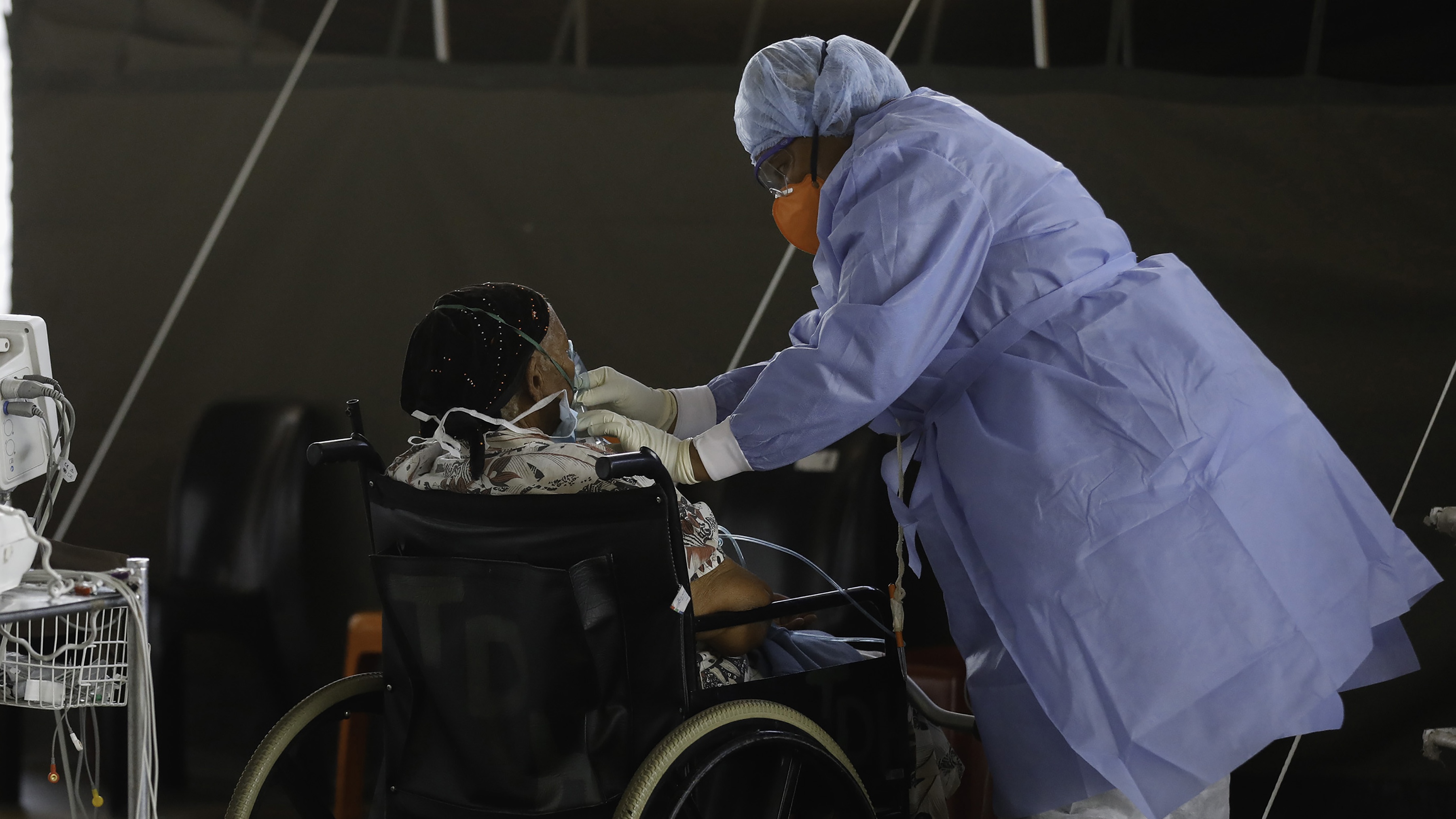What has the UK learned about Omicron from South Africa?
Early data suggests the new Covid-19 variant may be milder with fewer hospitalised patients requiring oxygen

A free daily email with the biggest news stories of the day – and the best features from TheWeek.com
You are now subscribed
Your newsletter sign-up was successful
There is now community transmission of the Covid-19 variant Omicron in the UK, Sajid Javid told MPs yesterday.
The health secretary said the new strain, which was first detected in South Africa, is “continuing to spread here and around the world”, ITV News reported. The 336 confirmed cases in the UK includes people whose infection has no link to international travel.
With at least 52 countries now affected, many are looking back to South Africa for early clues about what the variant means for their nations.
The Week
Escape your echo chamber. Get the facts behind the news, plus analysis from multiple perspectives.

Sign up for The Week's Free Newsletters
From our morning news briefing to a weekly Good News Newsletter, get the best of The Week delivered directly to your inbox.
From our morning news briefing to a weekly Good News Newsletter, get the best of The Week delivered directly to your inbox.
The early data
A new report from the South African Medical Research Council, released on Saturday, suggests the new strain could cause a milder infection based on several factors, including in-hospital death rates, the level of care required in hospital, oxygen use and the length of stay in hospital.
So far, early data from the Steve Biko/Tshwane District Hospital Complex in Pretoria, in Gauteng province where Omicron was first detected, suggests there has not been a significant increase in in-hospital deaths despite a “dramatic” rise in the number of cases in the province.The report did warn, however, that this could be due to a lag between cases and deaths – a more definite trend will become apparent in the coming weeks.
The report also noted that the majority of patients – around 70% – were not oxygen-dependent and that most of the patients had been admitted to hospital for medical reasons other than Covid-19.
A free daily email with the biggest news stories of the day – and the best features from TheWeek.com
Another marked difference with the Omicron strain appears to be the age profile of those infected. At the moment it appears to affect younger people than previous prevalent strains of the virus.
An analysis of 166 patients admitted to the hospital between 14 and 29 November found that “no fewer than 80% of admissions were below the age of 50 years”, while 19% of those infected were children aged nine and below. The highest number of admissions came from those in the 30-39 age group, which made up 28%.
However, the report said that it was “essential to recognise” that the data only covered the first two weeks of the Omicron wave in Tshwane (Pretoria), warning that the “clinical profile of admitted patients could change significantly over the next two weeks, by which time we can draw conclusions about the severity of disease with greater precision”.
The significance for the UK
It is “difficult to draw conclusions” about the implications of the data coming out of South Africa for other countries such as the UK, given that South Africa has a “much younger population that is less likely to be vaccinated”, said Sky News. According to Our World in Data, less than 30% of the population has at least one vaccine, compared with 75% of the UK.
And there is little evidence yet that Omicron is “inherently a more mild strain”, cautioned John Burn-Murdoch, chief data reporter for the Financial Times (FT).
What the data does seem to bear out is that the variant is “more mild for people with immunity from either recent vaccination or infection”, he wrote on Twitter. This means that while Omicron’s mutations could affect protection against infection, it appears that vaccinations are still very effective in protecting against severe illness.
A point of concern remains that Omicron-driven hospitalisation rates are rising much faster than in previous waves, which in turn could drive up ICU admissions, even if the majority experience a much milder illness.
“Even if far less than 25% of patients require ICU this time, a small share of a rapidly increasing number can still become a big number. And numbers are going up very, very fast,” said Burn-Murdoch.
“With governments very reluctant to reimpose major restrictions, Omicron’s growth advantage (whether conferred by shorter incubation period, immune evasion and or something else) is bound to produce very rapid waves of infections when it takes hold.”
Government officials and scientific advisers in the UK believe that the severity of the Omicron variant “may not be clear until January”, reported The Guardian.
There is a “wariness about overreacting” in government but senior Sage scientists have “made the case privately that the additional precaution of home working should be taken in the run-up to Christmas and that the government should start to suggest that people take sensible steps to minimise social contact in the days before seeing loved ones”, said the paper.
But so far Boris Johnson has advised that the country presses ahead with Christmas plans, including parties and school nativity plays.
Sorcha Bradley is a writer at The Week and a regular on “The Week Unwrapped” podcast. She worked at The Week magazine for a year and a half before taking up her current role with the digital team, where she mostly covers UK current affairs and politics. Before joining The Week, Sorcha worked at slow-news start-up Tortoise Media. She has also written for Sky News, The Sunday Times, the London Evening Standard and Grazia magazine, among other publications. She has a master’s in newspaper journalism from City, University of London, where she specialised in political journalism.
-
 6 of the world’s most accessible destinations
6 of the world’s most accessible destinationsThe Week Recommends Experience all of Berlin, Singapore and Sydney
-
 How the FCC’s ‘equal time’ rule works
How the FCC’s ‘equal time’ rule worksIn the Spotlight The law is at the heart of the Colbert-CBS conflict
-
 What is the endgame in the DHS shutdown?
What is the endgame in the DHS shutdown?Today’s Big Question Democrats want to rein in ICE’s immigration crackdown
-
 A Nipah virus outbreak in India has brought back Covid-era surveillance
A Nipah virus outbreak in India has brought back Covid-era surveillanceUnder the radar The disease can spread through animals and humans
-
 Is the US about to lose its measles elimination status?
Is the US about to lose its measles elimination status?Today's Big Question Cases are skyrocketing
-
 Covid-19 mRNA vaccines could help fight cancer
Covid-19 mRNA vaccines could help fight cancerUnder the radar They boost the immune system
-
 Is this the end of ultraprocessed foods?
Is this the end of ultraprocessed foods?Today's Big Question California law and the MAHA movement are on the same track
-
 Can TrumpRx really lower drug prices?
Can TrumpRx really lower drug prices?Today’s Big Question Pfizer’s deal with Trump sent drugmaker stocks higher
-
 The new Stratus Covid strain – and why it’s on the rise
The new Stratus Covid strain – and why it’s on the riseThe Explainer ‘No evidence’ new variant is more dangerous or that vaccines won’t work against it, say UK health experts
-
 RFK Jr. vaccine panel advises restricting MMRV shot
RFK Jr. vaccine panel advises restricting MMRV shotSpeed Read The committee voted to restrict access to a childhood vaccine against chickenpox
-
 RFK Jr. scraps Covid shots for pregnant women, kids
RFK Jr. scraps Covid shots for pregnant women, kidsSpeed Read The Health Secretary announced a policy change without informing CDC officials